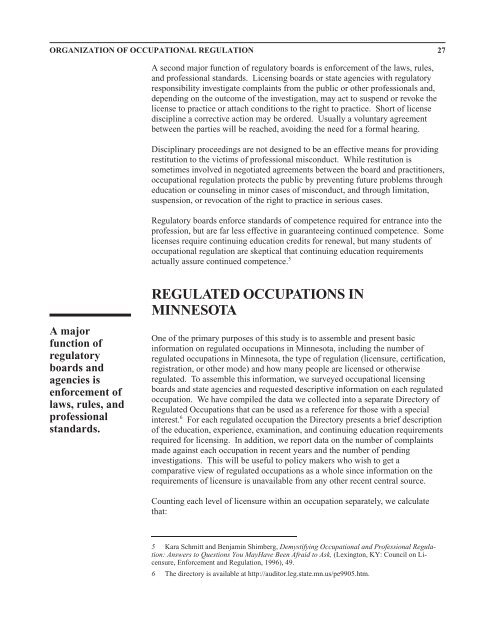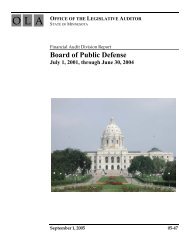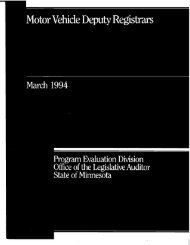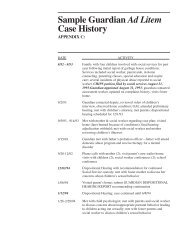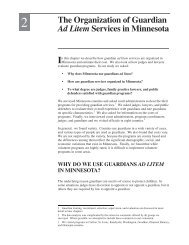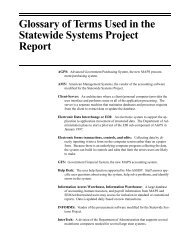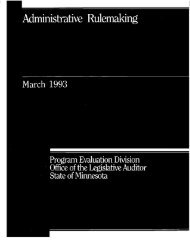Occupational Regulation - Office of the Legislative Auditor
Occupational Regulation - Office of the Legislative Auditor
Occupational Regulation - Office of the Legislative Auditor
Create successful ePaper yourself
Turn your PDF publications into a flip-book with our unique Google optimized e-Paper software.
ORGANIZATION OF OCCUPATIONAL REGULATION 27<br />
A second major function <strong>of</strong> regulatory boards is enforcement <strong>of</strong> <strong>the</strong> laws, rules,<br />
and pr<strong>of</strong>essional standards. Licensing boards or state agencies with regulatory<br />
responsibility investigate complaints from <strong>the</strong> public or o<strong>the</strong>r pr<strong>of</strong>essionals and,<br />
depending on <strong>the</strong> outcome <strong>of</strong> <strong>the</strong> investigation, may act to suspend or revoke <strong>the</strong><br />
license to practice or attach conditions to <strong>the</strong> right to practice. Short <strong>of</strong> license<br />
discipline a corrective action may be ordered. Usually a voluntary agreement<br />
between <strong>the</strong> parties will be reached, avoiding <strong>the</strong> need for a formal hearing.<br />
Disciplinary proceedings are not designed to be an effective means for providing<br />
restitution to <strong>the</strong> victims <strong>of</strong> pr<strong>of</strong>essional misconduct. While restitution is<br />
sometimes involved in negotiated agreements between <strong>the</strong> board and practitioners,<br />
occupational regulation protects <strong>the</strong> public by preventing future problems through<br />
education or counseling in minor cases <strong>of</strong> misconduct, and through limitation,<br />
suspension, or revocation <strong>of</strong> <strong>the</strong> right to practice in serious cases.<br />
Regulatory boards enforce standards <strong>of</strong> competence required for entrance into <strong>the</strong><br />
pr<strong>of</strong>ession, but are far less effective in guaranteeing continued competence. Some<br />
licenses require continuing education credits for renewal, but many students <strong>of</strong><br />
occupational regulation are skeptical that continuing education requirements<br />
actually assure continued competence. 5<br />
A major<br />
function <strong>of</strong><br />
regulatory<br />
boards and<br />
agencies is<br />
enforcement <strong>of</strong><br />
laws, rules, and<br />
pr<strong>of</strong>essional<br />
standards.<br />
REGULATED OCCUPATIONS IN<br />
MINNESOTA<br />
One <strong>of</strong> <strong>the</strong> primary purposes <strong>of</strong> this study is to assemble and present basic<br />
information on regulated occupations in Minnesota, including <strong>the</strong> number <strong>of</strong><br />
regulated occupations in Minnesota, <strong>the</strong> type <strong>of</strong> regulation (licensure, certification,<br />
registration, or o<strong>the</strong>r mode) and how many people are licensed or o<strong>the</strong>rwise<br />
regulated. To assemble this information, we surveyed occupational licensing<br />
boards and state agencies and requested descriptive information on each regulated<br />
occupation. We have compiled <strong>the</strong> data we collected into a separate Directory <strong>of</strong><br />
Regulated Occupations that can be used as a reference for those with a special<br />
interest. 6 For each regulated occupation <strong>the</strong> Directory presents a brief description<br />
<strong>of</strong> <strong>the</strong> education, experience, examination, and continuing education requirements<br />
required for licensing. In addition, we report data on <strong>the</strong> number <strong>of</strong> complaints<br />
made against each occupation in recent years and <strong>the</strong> number <strong>of</strong> pending<br />
investigations. This will be useful to policy makers who wish to get a<br />
comparative view <strong>of</strong> regulated occupations as a whole since information on <strong>the</strong><br />
requirements <strong>of</strong> licensure is unavailable from any o<strong>the</strong>r recent central source.<br />
Counting each level <strong>of</strong> licensure within an occupation separately, we calculate<br />
that:<br />
5 Kara Schmitt and Benjamin Shimberg, Demystifying <strong>Occupational</strong> and Pr<strong>of</strong>essional <strong>Regulation</strong>:<br />
Answers to Questions You MayHave Been Afraid to Ask, (Lexington, KY: Council on Licensure,<br />
Enforcement and <strong>Regulation</strong>, 1996), 49.<br />
6 The directory is available at http://auditor.leg.state.mn.us/pe9905.htm.


